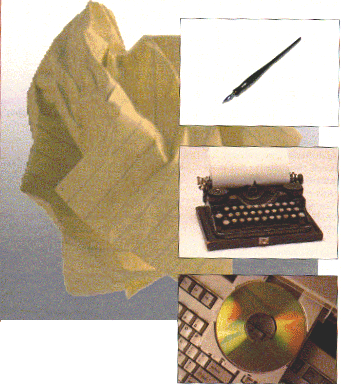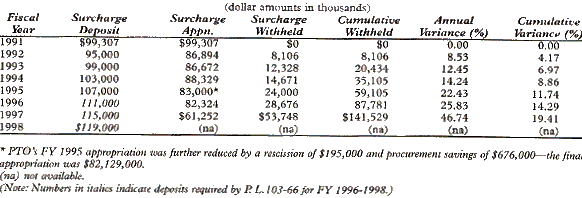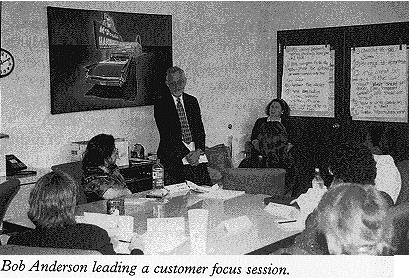
THE YEAR AHEAD
Critical Areas for Financial and Management Improvement
The PTO continued to address the following critical areas for financial and management improvement in FY 1996:
- restrictions in the number of PTO employees;
- continued withholding of funds by Congress;
- proposals to make the PTO a wholly owned government corporation; and
- re-engineering projects.
Personnel Ceilings
The PTO continues to be challenged by personnel ceilings set at levels below those required to attain production and customer service goals. Pendency and inventory are rising in patents and trademarks as growth in incoming work has exceeded the growth in staff needed to address this work. The PTO has responded to this challenge by contracting work where possible in the short term and re-engineering processes in the long term. The PTO will continue to seek personnel levels commensurate with customer demand for our services.

Withholding of PTO Funds
The enactment of the Omnibus Budget Reconciliation Act of 1990 (Public Law 101-508) put the PTO on path to be funded entirely through sales of its products and services. This was accomplished by increasing patent fees by 69 percent, followed by a smaller subsequent increase. This 69 percent increase was a surcharge to be deposited to a specific Treasury account. Subsequent legislation removed the specific percentage but required the PTO to deposit exact dollar amounts of surcharges. By law, these deposits are scheduled to continue through FY 1998.
Because of declining funds allotted to House and Senate appropriations subcommittees, the subcommittees have not appropriated the full amount of the surcharge back to the PTO. An increasing amount of the surcharge has been withheld since FY 1992. To date, $141.5 million has been withheld. Of our FY 1997 surcharge deposit of $115 million, congressional committees withheld nearly $54 million, which is more than 46 percent of our deposited amount. The following table shows the amounts that have been withheld to date and scheduled deposits through FY 1998:
Corporation Proposals
Various proposals were introduced in Congress during FY 1996 to transform the PTO into a performance-based, wholly owned government corporation. All of these proposals would result in a more commercial entity that could provide more flexible service to its customers. Potential flexibilities as a government corporation include borrowing authority, investment authority, relief from personnel ceilings, and exemption from certain Federal building regulations. While action was not completed on these bills, the PTO intends to work toward reintroduction of the Administrations proposal in FY 1997.
Re-engineering Projects
Re-engineering efforts are under way in both patent examination and trademark examination. The focus of these projects is to deliver to customers a re-engineered process that meets their business needs, in terms of both cost and service. Transition planning in these projects will continue in FY 1997. The movement from our current processes to our re-engineered processes will involve significant one-time development and transition costs. These costs will be an investment in our infrastructure, primarily in automation, that will pay long-term benefits to agency customers. Benefits from the re-engineered processes will be realized over time, resulting in shorter processing times and a more responsive system despite continued growth in workload. When fully implemented, the PTO should realize significant long-term cost savings. Budget reductions in areas funded by patent fees, however, may force scaling back, postponing, or eliminating many of these programs.
The Year Ahead
- Congress will again consider significant intellectual property legislation, including bills to: recast the Patent and Trademark Office as a performance-based, wholly owned government corporation under the policy direction of the Secretary of Commerce; make important patent law reforms such as early publication of patent applications and improvement of re-examination procedures; and ensure copyright protection for works transmitted over the National Information Infrastructure.
- The Conference on Fair Use (CONFU), convened by the Working Group on Intellectual Property Rights, will bring together copyright owner and user interests to discuss fair use issues and, if warranted and feasible, to develop guidelines for uses of copyrighted works by librarians and educators.
- The PTO will continue to be an active participant in a variety of international multilateral and bilateral activities, with the goal of securing and expanding protection of U.S. intellectual property.
- The PTO will hold hearings and solicit public comments on Internet domain name registration policies to assess the publics views on whatis considered essential to reduce the legal liabilities and conflicts between the use of domain names and trademarks and to determine the role, if any, for the PTO.
- During FY 1997, the PTO expects to receive approximately 212,000 patent application filings, and to receive trademark application filings for more than 218,000 classes.
- The Trademark Office has begun work on the first phase of 53 transition projects that will result in a re-engineered trademark process. Phase I consists of 35 projects that will result in enhancements to existing information systems as well as the development of policies, procedures, personnel, and functional technology requirements to be used in building and implementing the future Trademark Information System. Significant changes, expected to be in place by the end of the year, will streamline the processing of new applications and the publication and printing of registered marks.
- The Trademark Office worked in conjunction with the National Institute of Standards and Technology to implement requirements of the Fastener Quality Act (P.L. 101-592). The PTO will begin receiving and processing requests filed under the Act, which requires recordation of the insignia of manufacturers and private label distributors to ensure the traceability of a fastener to its manufacturer or private label distributor.
- Eighteen trademark examining attorneys will begin working from home two days a week as the Trademark Flexiplace Pilot program is implemented. The results of the pilot will be evaluated during the next two years.


